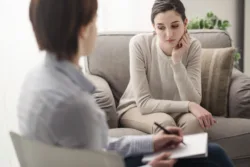
Therapy is a powerful tool that can help heal, strengthen and even aid in recovering all types of relationships, including the one you have with your partner. While there is a specific type of counseling for couples, also known as couples therapy, or marital therapy, there are many occasions where only one person is actively going to therapy.
Individual therapy can have multiple positive effects on a relationship just as couples therapy can, including some that might surprise you.
Top benefits of therapy
Maybe you’ve been in therapy for a while and you want a direct insight into how it’s affecting your relationship. On the other hand, maybe you’re considering going to therapy for the first time, and wondering in what way it would affect your relationship. Here are seven key effects.
1. Get to know yourself on a deeper level
It’s hard to express yourself when you don’t know yourself very well; this, in turn, often causes couples to misunderstand and become frustrated with each other. Sometimes we wish our partner would be able to read our minds so we wouldn’t have to go through the — what sometimes feels impossible —trouble of expressing ourselves.
Therapy can help you get to know yourself on a deeper level, which enables you to more easily express yourself, allowing your partner to get to know you more intimately as well.
2. Mastering your emotions
At times, it can feel like we are led blindly by our emotions; instead of being master over them, we are enslaved to their incessant fluctuations. It doesn’t have to be like this though.
Mastering emotions isn’t about dismissing or minimizing what you feel, but enabling you to be consciously aware of your emotions. When you are lucidly aware of a situation and how it’s making you feel, you empower yourself to think before you respond, instead of saying the first emotional thought that comes to mind.
3. Improving your communication skills
We’ve all heard the timeless relationship truth that communication is key, but so many of us struggle to clearly and respectfully articulate our wants, needs and frustrations with our partner.
Perhaps it’s because you grew up in a home where your wants and needs were invalidated; maybe previous partners conditioned you to believe what you want isn’t important; maybe voicing your thoughts in the past was met with hostility, and now you’re afraid to do so again.
Whatever is preventing you from being able to communicate kindly and honestly with a partner, therapy will help you discover and heal from it.
4. Learning to argue respectfully
When you’re in a heated discussion with your partner, it can be tempting to bring up past moments where they let you down, in an attempt to gain superiority in the argument.
While disagreements are natural in a relationship, there’s a type of arguing that doesn’t do damage to your relationship, or the other person’s dignity.
Therapy can help you learn to recognize personal triggers, as well as provide a fresh insight into arguing, so that you and your partner can have healthy disagreements that leave you both feeling respected and understood.
5. Building your confidence
As imperfect people, we have insecurities, and while these insecurities might never fully go away, they don’t have to control you or bully your relationship.
Building your confidence empowers you to have a more positive perspective not only of yourself, but of your life as a whole. Being authentically, individually happy is not only beneficial for you personally, but it takes the pressure off of your partner to be the sole source of your joy.
Therapy can help you build up your self-esteem by teaching you how to set healthy boundaries, see yourself in a more uplifting light and be your truest self in and outside of your relationship.
6. Learning how to forgive
One of the most difficult things to do in a relationship is forgive. If we look at forgiveness the wrong way, it can feel disempowering, as if forgiving is a weakness, a form of conceding, a sign that the other person wears the pants in the relationship.
True forgiveness is not about forgetting what the other person has done, as the age-old saying “forgive and forget” would imply; it is about acknowledging what has happened, and choosing to release any feelings of resentment or vengeance. It’s about emotionally letting go of what happened so that it doesn’t become a weapon in future discussions or arguments.
7. Inspiring your partner to grow
Some people are very resistant to go to therapy, and they may even have a hostile perspective of the practice. You might be drawn to couples’ therapy, but your partner isn’t open to it; and yet, if you start going to individual therapy, it might just inspire your partner to start going as well.
Want additional support?
You can contact the team here at The Light Program by calling 610-644-6464.






